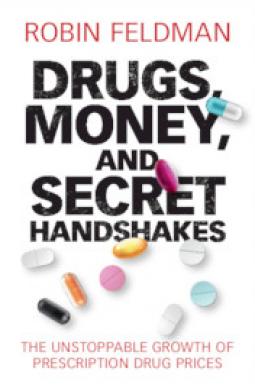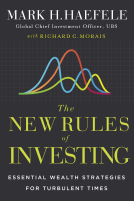
Drugs, Money, and Secret Handshakes
The Unstoppable Growth of Prescription Drug Prices
by Robin Feldman
This title was previously available on NetGalley and is now archived.
Send NetGalley books directly to your Kindle or Kindle app
1
To read on a Kindle or Kindle app, please add kindle@netgalley.com as an approved email address to receive files in your Amazon account. Click here for step-by-step instructions.
2
Also find your Kindle email address within your Amazon account, and enter it here.
Pub Date Mar 25 2019 | Archive Date May 09 2019
Talking about this book? Use #DrugsMoneyAndSecretHandshakes #NetGalley. More hashtag tips!
Description
In the warped world of prescription drug pricing, generic drugs can cost more than branded ones, old drugs can be relaunched at astronomical prices, and low-cost options are shut out of the market.
In Drugs, Money and Secret Handshakes, Robin Feldman shines a light into the dark corners of the pharmaceutical industry to expose a web of shadowy deals in which higher-priced drugs receive favorable treatment and patients are channeled toward the most expensive medicines.
At the center of this web are the highly secretive middle players who establish coverage levels for patients and negotiate with drug companies.
By offering lucrative payments to these middle players (as well as to doctors and hospitals), drug companies ensure that inexpensive drugs never gain traction. This system of perverse incentives has delivered the kind of exorbitant drug prices - and profits - that everyone loves except for those who pay the bills.
Available Editions
| EDITION | Hardcover |
| ISBN | 9781108482455 |
| PRICE | $29.99 (USD) |
Average rating from 12 members
Featured Reviews
This is a very interesting book. The introduction is a good example of a clear and interesting intro. It invites me to start reading and also explains what will be told. I worked in health care for six years and asked myself the same questions as the author asked, probably. Why does it all have to be so bloody expensive? This book is focused on the United States, but I can tell you that it's the same in Europe, and anywhere else on the world. The moral concerns raised by the people who are interested in this topic are just and that's why books like these need to be written and read by many people.
The story is supported by helpful figures and understandable analogies. It's a little number heavy, and not particularly an easy bedtime read. But it's very insightful and I really learned some new things. For example the recycling of drugs, newly released drugs are often old ones but in different capsules. They are then released under a new brand name and the makers can then benefit again from a patent-protected few years. (So they can get way more money for the drugs!)
So, if you are interested in health care, definitely read this book. Books like these should be mandatory for health care professionals, I think.
Drugs, Money, and Secret Handshakes is a detailed critique of the pharmaceutical industry, the system that encourages high drug prices, and the perverse incentives that can drive prices even higher.
The book discusses the multiple factors that can lead to extremely high drug prices, and the slowed availability of cheaper generic molecules. The book is heavily-focussed on the politico-economic factors that shape the system. Between a pharmaceutical company with a new drug and their potential patients sit layers of pharmacy benefit managers (PBMs), insurance companies, the FDA, pharmacies and hospitals, the network of which make the cost of a drug very difficult to elucidate. All of these large players have financial interests that can be misaligned with the interests of the public.
Personally, I am predominantly interested in the drug design process, the costs associated with bringing a drug to market, and the general trends represented by Eroom's law. The book does not cover this, but focuses instead on the economics involved from the point at which a molecule is close to approval. Possibly these post-approval factors have a larger influence on the price point of a molecule than the "scientific" costs may have.
Feldman’s research is purely US focussed, which is not apparent from the cover or blurb. It did make me wonder how much the rest of the world is benefitting from the overpaying that occurs in the US; would the NHS see higher drug prices if there were smaller profit margins within the US? That US drug prices are subsidizing other countries health may be an effective motivation towards national healthcare for some Americans.
Overall, the book was educational, however was not an easy read, particularly when I was expecting a more general popular-science book. However, if enjoy the economic-focus, there is plenty in the book to leave you appalled.
A Klaxon Call. In this exceedingly well documented scholarship, Feldman presents the case well. And what an alarming case it is. Drug manufacturers have found ways to game the system at all levels such that the existing system in the US actually *encourages* ever higher drug prices - even as patients are crying out under the strain and in many cases forgoing life saving medication due to not being able to afford it. Feldman explains the problem at all levels though four of the six chapters of the book, with the first chapter being an overall introduction to the problem and the final chapter being suggested solutions - including a range going from possibly politically palatable yet likely ineffective to very likely effective but less likely to be politically palatable. Overall a stunning work that could - and likely should - drive at least some discussions through the 2020 election cycle.
Readers who liked this book also liked:
Leland Vittert
Biographies & Memoirs, Nonfiction (Adult), Parenting, Families, Relationships
John Kotter; Holger Rathgeber
Business, Leadership, Finance, Nonfiction (Adult)
Marie Bostwick
Historical Fiction, Literary Fiction, Women's Fiction
Rachel Joyce
Historical Fiction, Literary Fiction, Women's Fiction
James McBride
General Fiction (Adult), Historical Fiction, Literary Fiction
Mark Haefele; Richard C. Morais
Business, Leadership, Finance, Nonfiction (Adult)


















